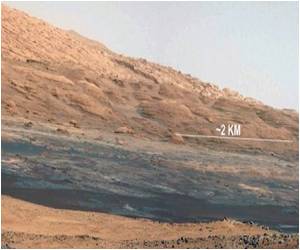
As magma moves upward toward the surface and pressure decreases, that carbon is released as a gas.
On Earth, carbon is trapped in magma as carbonate and degassed as carbon dioxide, a greenhouse gas that helps Earth's atmosphere trap heat from the sun.
But how carbon is transferred from underground to the atmosphere in other planets - and how that might influence greenhouse conditions - wasn't well understood.
"We know carbon goes from the solid mantle to the liquid magma, from liquid to gas and then out," Alberto Saal, professor of geological sciences at Brown and one of the study's authors, said.
"We want to understand how the different carbon species that are formed in the conditions that are relevant to the planet affect the transfer," he said.
Advertisement
The findings suggest that when volcanism was widespread early in Mars' history, it may have released enough methane to keep the planet significantly warmer than it is today.
Advertisement
Source-ANI








